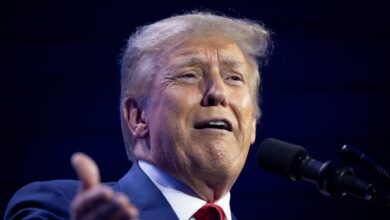U.S. Issues Final Rules to Keep Chip Funds Out of China

The Biden administration on Friday issued final rules that would prohibit chip companies vying for a new infusion of federal cash from carrying out certain business expansions, partnerships and research in China, in what it described as an effort to protect United States national security.
The regulations come as the Biden administration prepares to disburse more than $52 billion in federal grants and tens of billions of dollars of tax credits to build up the U.S. chip industry. The new rules aim to prevent chip makers that benefit from U.S. grants from passing technology, business know-how or other benefits to China.
The final restrictions will prohibit firms that receive federal money from using it to construct chip factories outside the United States. They also restrict companies from significantly expanding semiconductor manufacturing in “foreign countries of concern” — defined as China, Iran, Russia and North Korea — for 10 years after receiving an award, the administration said.
The rules also prevent companies that receive funding from carrying out certain joint research projects in those countries, or licensing technology that would raise national security concerns to those countries.
If a company violated those guardrails, the Commerce Department said, the government could claw back the firm’s entire award.
“These guardrails will protect our national security and help the United States stay ahead for decades to come,” Gina M. Raimondo, the secretary of commerce, said in a statement.
The restrictions have been the subject of heavy lobbying from the chip industry, which collectively earns about one-third of its revenue from China. Chip makers in comments filed this year expressed concerns that overly restrictive measures could disrupt supply chains and hamper their global competitiveness.
Many of the rule’s broad principles, like the 10-year limit on new investments in China, were outlined in the bipartisan legislation that authorized funding for the sector. But Commerce Department officials were responsible for writing the detailed provisions of the rule.
In its final rules issued Friday, the department appeared to take the perspective of chip makers and others into account. A comparison of the restrictions showed that the department had made several changes supported by chip makers, such as abolishing a specific dollar threshold for transactions that would expand chip companies’ manufacturing capacity in China, Russia, North Korea or Iran. Under the proposed rule in March, the Commerce Department would have reviewed any transaction that expanded a company’s semiconductor manufacturing capacity in such a “country of concern” valued at more than $100,000.
But companies like Taiwan Semiconductor Manufacturing Company suggested that it would be more pragmatic for the department to monitor the physical expansion of the footprint of semiconductor factories, a standard that the commerce department adopted.
It remains to be seen if any of the changes will prompt a backlash from Republicans on Capitol Hill, who have criticized the Biden administration as not being tough enough on Beijing and condemned a recent set of trips to China by top administration officials.
In an interview on Friday, Commerce Department officials said that they had received various requests from the industry to relax certain guidelines, but that they had maintained or even strengthened some provisions where necessary to protect national security.
One official added that the national security goal of the program was to have companies operating in the United States and doing so successfully, and that the department aimed to work with companies to ensure they were executing on U.S. grants.
“My sense is that they struck a reasonable balance between trying to be restrictive but also not trying to be draconian with the impact on existing facilities in China,” said Chris Miller, the author of “Chip War” and an associate professor of international history at the Fletcher School at Tufts University.




